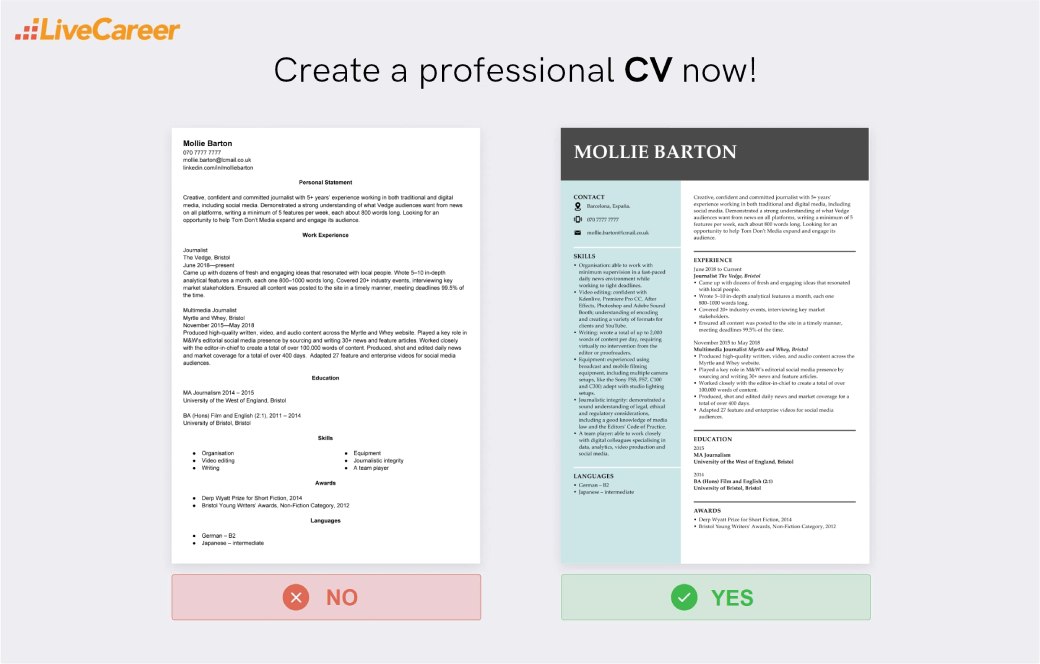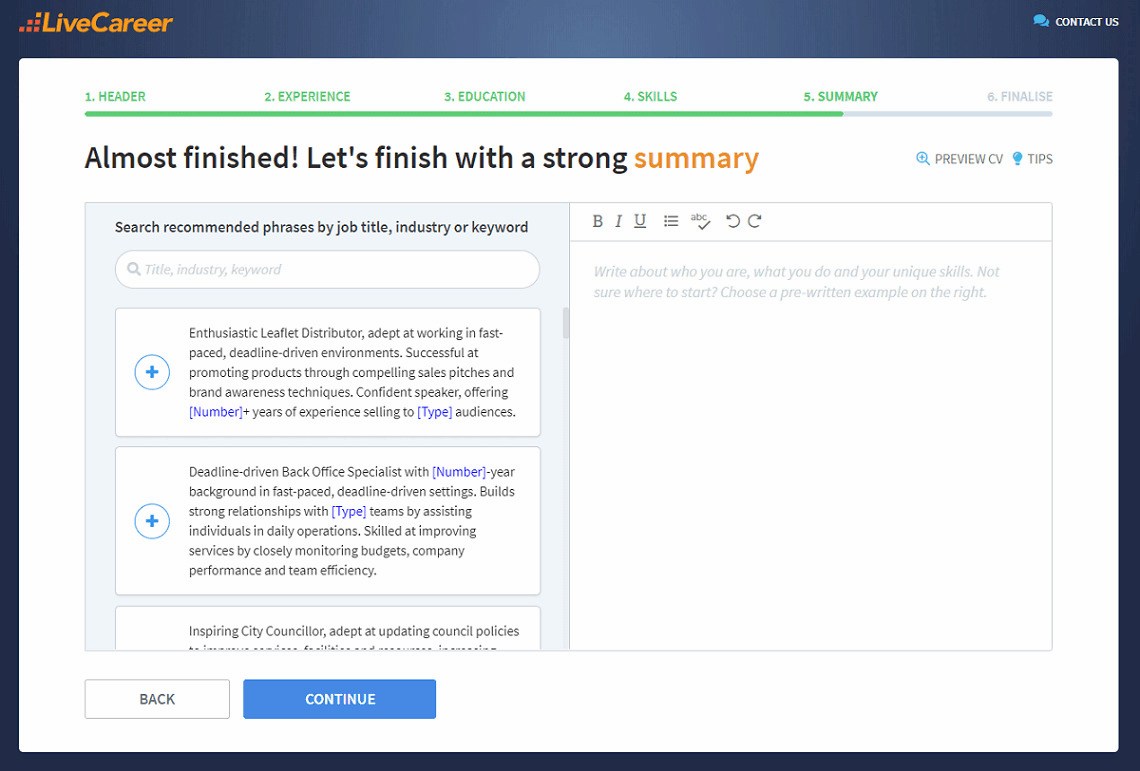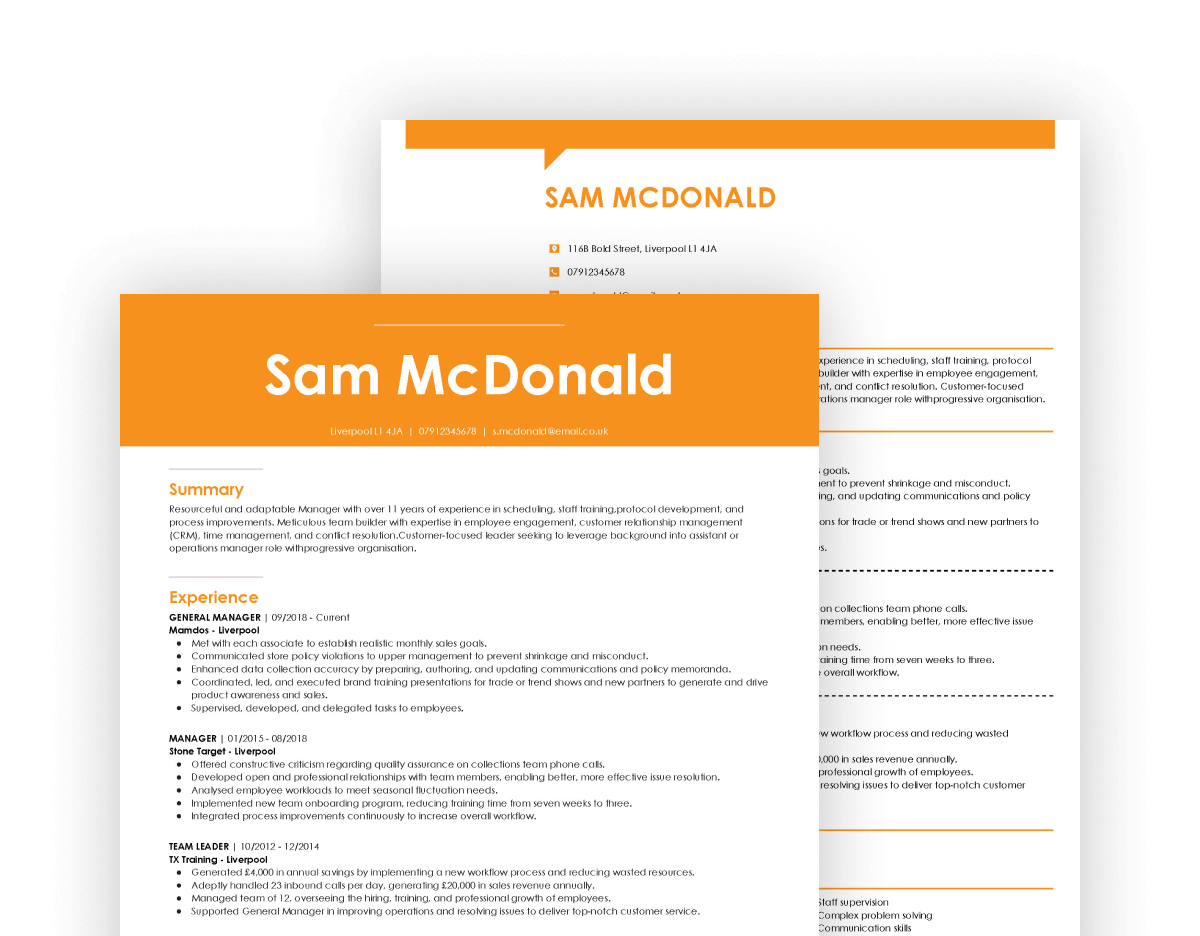8 Graduate CV Examples, Templates & Tips for 2025
Writing your first-ever graduate CV? Check our comprehensive guide featuring a graduate CV example, template, expert tips, and tricks to make your CV stand out.
Our customers were hired by:
You’ve put a lot of time and effort into your university degree, and want to do it justice in your CV. There’s a lot of conflicting advice out there when it comes to how to write a degree on a CV, though. From how to abbreviate degree types to how to write up an honours class.
This article is here to give you proven approaches for how to write your degree on a CV in the UK. With expert examples of how to write degree clasification on a CV, you’ll be confident that your education section contains all it needs and is set out such that it actually gets read.
Create an effective CV in minutes. Choose a professional CV template and fill in every section of your CV in a flash using ready-made content and expert tips.

We created the sample on the right using our builder. See other good CV examples like this one.
Want to research other useful guides on CV writing? See these articles:
Having examined 6 million CVs created in our builder, we found that*:
*The data comes from a period of the last 12 months (August 2023-August 2024).
Mollie Barton
070 7777 7777
mollie.barton@lcmail.co.uk
linkedin.com/in/molliebarton
Personal Statement
Creative, confident and committed journalist with 5+ years’ experience working in both traditional and digital media, including social media. Demonstrated a strong understanding of what Vedge audiences want from news on all platforms, writing a minimum of 5 features per week, each about 800 words long. Looking for an opportunity to help Tom Don’t Media expand and engage its audience.
Work Experience
Journalist
The Vedge, Bristol
June 2018—present
Multimedia Journalist
Myrtle and Whey, Bristol
November 2015—May 2018
Education
MA Journalism 2014 – 2015
University of the West of England, Bristol
BA (Hons) Film and English (2:1), 2011 – 2014
University of Bristol, Bristol
Skills
Awards
Languages
Depending on your educational background, you can include various degrees and abbreviations in your CV. A typical classification includes two degree categories: undergraduate and postgraduate degrees.
The undergraduate degrees include:
The postgraduate degrees are:
After completing a master’s degree, you can do a PhD or a research degree which will take at least 2 years and will top up your previous education history.
Once you’re a proud holder of an academic degree, it’s important that you showcase it in your CV’s crucial sections. Where and how to write a degree on a CV?
For starters, mention your degree in your personal profile, especially if you’re a fresh graduate. Put your University and degree names at the beginning of your personal statement before presenting your individual traits and skills.
Most importantly, include your degree in the education section of your CV. List your qualifications in reverse-chronological order and place your academic title and dates of studying first. Below, mention the university name and the location.
If you're still completing your most recent degree and writing a student CV, list your expected graduation date instead of the actual date. You can leave your high-school education out of your CV once you have an undergraduate degree and a year or more of postgraduate study or post-graduation work experience.
PhD Philosophy, 2016 – 2020
University of Edinburgh, Edinburgh
MPhil Philosophy, 2015 – 2016
University of Southampton, Southampton
BA (Hons) Philosophy (1st), 2011 – 2014
University of Winchester, Winchester
A strong CV summary will convince the recruiter you’re the perfect candidate. Save time and choose a ready-made personal statement written by career experts and adjust it to your needs in the LiveCareer CV builder.

A bachelor’s degree is where most people begin their tertiary education, but it’s certainly not the only way into postgraduate study. The following template will guide you through setting out your bachelor’s degree in your CV. It can also be adapted for other tertiary qualifications.
[Degree Type] [Degree Name], [Years Attended]
[University Name], [University Location]
Use standard abbreviations for the degree type, like ‘BA’, ‘BSc’, and ‘BEng’, but don’t abbreviate the degree name, so ‘Mechanical Engineering’ rather than ‘Mech. Eng.’. Once again, include an expected graduation date if you’re still studying the given degree. Don’t include anything not required by the template.
BA Film and English, 2011 – 2014
University of Bristol, Bristol
Honours can be hard to come by in many fields. Be sure to do your achievement justice by clearly including the abbreviation ‘Hons’ in your degree description. This can really give you an edge on the labour market. Use the following template that best answers the question of how to write first-class honours on a CV:
[Degree Type] [Degree Name](Degree Class), [Years Attended]
[University Name], [University Location]
Include your degree class only if you’ve achieved upper-division second-class honours or first-class honours. Anything less should be characterised simply by its degree type and degree name. There are several acceptable ways to abbreviate your honours degree class, or you might choose not to abbreviate at all.
Writing upper-second class as ‘2:1’ is perhaps the most common, although ‘2.1’ is equally appropriate.
First class can be abbreviated as ‘1st’ or simply left as ‘first’. If you wish to use full words instead, write 'First Class' or 'First Class Honours'
Don’t include lower second- (2:2) or third- (3rd) class honours, but leave the ‘Hons’ after your degree type or name.
BA (Hons) Film and English (2:1), 2011 – 2014
University of Bristol, Bristol
In many countries, a master’s degree is considered the minimum for jobs that require you to have a higher education. For some people, it’s a stepping stone toward a doctorate and a career in academia. In any case, completing a master’s degree is an achievement of which you should definitely be proud.
If you completed your master’s by coursework, without having to conduct research and submit a thesis, use the following template. This template and its caveats should be familiar to you by now. Abbreviate only the degree type (e.g. ‘MA’ rather than ‘Master of Arts’).
[Degree Type] [Degree Name], [Years Attended]
[University Name], [University Location]
MA Journalism 2014 – 2015
University of the West of England, Bristol
Completing a master’s by research is, for most people, their first taste of independent academic research. It’s also usually the first opportunity you get to contribute something novel to your field, even if only by slight extension or adaptation. Follow the same template as for a master’s by coursework degree.
Add to this template information regarding your thesis: the full title, your supervisor’s name, and your academic title. If you held a scholarship while completing your master’s degree, you can optionally include it here. You should only consider merit-based and/or competitive scholarships, though.
MPhil Journalism 2014 – 2016
University of the West of England, Bristol
For some people, a PhD is the ultimate destination on their academic journey and for others, the very beginning. Whichever camp you fall into, make sure your doctorate is given its due in your CV. The template remains unchanged from a master’s by research. Add thesis and scholarship information, too.
PhD English Literature, 2016 – 2020
University of Edinburgh, Edinburgh
It’s easy to get tunnel vision and lose sight of the fact that your education section is just one part of your CV, and your CV is just one part of your job application. As you’ve seen, getting your education section right isn’t difficult. Once it is sorted, you should take care of the big picture.
Here’s what to keep in mind beyond mentioning degrees on your CV:
One last piece of advice: follow up if it’s been a week since you submitted your application and still haven’t heard back. All it takes is a quick phone call or short email. It can make a huge difference. If nothing else, you’ll likely get some insight into how your application is going.
You don’t have to be a CV writing expert. In the LiveCareer CV builder you’ll find ready-made content for every industry and position, which you can then add with a single click.

Has this article answered your questions regarding how to write a degree on a CV? I hope it has, and then some. Please leave any questions, comments, feedback, and job-hunting experiences down in the comments section!
Our editorial team has reviewed this article for compliance with Livecareer’s editorial guidelines. It’s to ensure that our expert advice and recommendations are consistent across all our career guides and align with current CV and cover letter writing standards and trends. We’re trusted by over 10 million job seekers, supporting them on their way to finding their dream job. Each article is preceded by research and scrutiny to ensure our content responds to current market trends and demand.
About the author
Since 2013, the LiveCareer UK team has shared the best advice to help you advance your career. Experts from our UK editorial team have written more than one hundred guides on how to write the perfect CV or cover letter.
Rate this article:
How to write your degree on a cv
Average:

Writing your first-ever graduate CV? Check our comprehensive guide featuring a graduate CV example, template, expert tips, and tricks to make your CV stand out.
Discover inspiring CV examples for students and land your dream opportunities. Build a great student CV template that sets you apart from the crowd.
How to make a PhD application CV that entices reviewers and secures your spot in the academic spotlight? Get the answers with a PhD CV example & tips.
Our customers were hired by: